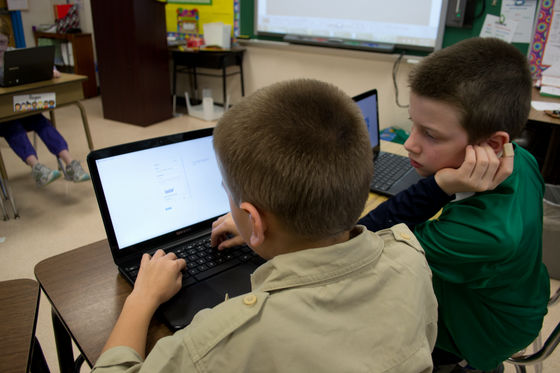It is pointed out that Google collects student browser browsing history · search history · YouTube viewing history

ByKevin Jarrett
At schools in the U.S., students are using Chromebooks a lot of cases, but what kind of sites are being viewed by students using this Chromebook, what they searched on YouTube The Electronic Frontier Foundation (EFF) points out that Google collects personal information such as whether you are watching images or saving what passwords.
Google Deceptively Tracks Students' Internet Browsing, EFF Says in FTC Complaint | Electronic Frontier Foundation
https://www.eff.org/press/releases/google-deceptively-tracks-students-internet-browsing-eff-says-complaint-federal-trade

Google accused of secretly collecting students' data | TheHill
http://thehill.com/policy/technology/261685-google-accused-of-breaking-student-privacy-pledge
The Electronic Frontier Foundation has launched the campaign "Spying on Students" to alert attention to the fact that students' privacy is being threatened by terminals provided by schools.
Specifically, Google Chromebook and "Google Apps for Education" are the subjects. Google Apps for Education is a cloud-based educational software program used in many schools throughout the United States.
In using it, we explained that personal information of students is not used for optimization of advertisement, but EFF pointed out that there were loopholes for the purpose of improving other services. In the Chromebook provided for schools, the synchronization function was set on from the beginning, and Google was in a state that it was possible for Google to know the student's browsing history, search history, YouTube viewing history, saved passwords, etc. It was.

ByKevin Jarrett
According to EFF, Google is doing this information gathering without obtaining permission from students and parents, and because some schools require the use of Chromebooks, it is impossible to prevent data collection He said that there were many students. There was an agreement between Google and educational institution not to use the student's personal information except for legitimate educational purposes or when parents granted permission.
Google explained that EFF pointed out that "Synchronization function was turned on" and turn off it sequentially. However, according to EFF this is only a small step, and the problem that the student is potentially collecting personal information when using the Chrome with parent's iPad, friend's smartphone, home PC, etc. continues It is said that there is.
In addition, Google has been accused of violating the user's privacy by avoiding the function of blocking the tracking cookie installed in the web browser "Safari", and in 2012 the Federal Trade Commission (FTC)We paid a fine of 22.5 million dollars (about 1.7 billion yen at the time at that rate), In 2013We pay punitive fines of 17 million dollars (about 2 billion yen at that rate). Also, in the UK the same kindI tried to invalidate a lawsuit against Google, but I rejected itIt has been decided that anyone who is tracked will be able to sue Google.
Related Posts:
in Education, Hardware, Web Service, Posted by logc_nt







